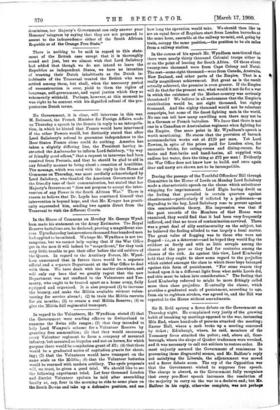Daring the passage of the Youthful Offenders' Bill through Committee
in the House of Lords on Monday Lord Salisbury made a characteristic speech on the clause which substitutes whipping for imprisonment. Lord Elgin having dwelt on the feeling that prevailed in certain quarters against chastisement—particularly if inflicted by a policeman—as degrading to the boy, Lord Salisbury rose to protest against this contamination theory. His impression was that if the past records of the Members of that House were examined, they would find that it had been very frequently inflicted, and that no trace of contamination survived. There was a great deal of silly sentimentality on the subject, but he believed the feeling alluded to was largely a local matter. The great value of flogging was to those who were not flogged– i.e., as a deterrent—and he hoped they would flog the evildoer as freely and with as little scruple among the classes of the poor as they had for centuries among the classes of the rich. As against this view, Lord Kimberley held that they ought to show some regard to the prejudice which existed amongst the class to which these boys belonged against this form of punishment. "For some reason they looked upon it in a different light from what noble Lords did, and this must be taken into consideration." The feeling that Lord Kimberley referred to might be more fittingly called mass than class prejudice. Edentually the clause, which provides a graduated scale of punishment, according to age, from six to eighteen strokes, was agreed to, and the Bill was reported to the House without amendments.
































 Previous page
Previous page